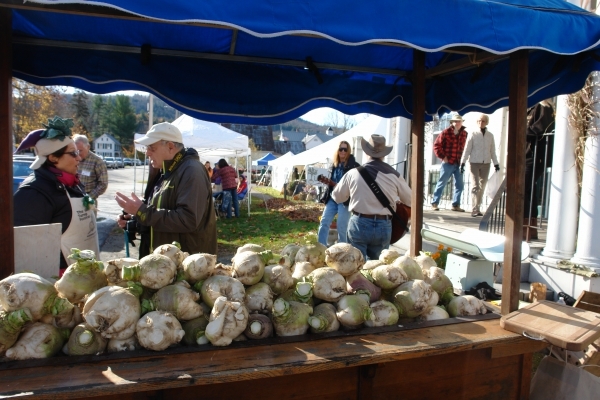WARDSBORO — On Oct. 24, Wardsboro's Gilfeather Turnip Festival celebrates its 13th year with all things Gilfeather turnip.
The yearly festival is the town's largest fundraising effort, with proceeds going to support the public library. Admission is free, but event organizers advise bringing plenty of cash to spend at the booths, carts, and kiosks.
A variety of prepared foods - all made with the Gilfeather turnip, of course - will be available at the chef's station, the Turnip Cafe, and the outdoor soup tent.
Attendees wishing to bring home an edible souvenir can stop by the large turnip cart parked outside Town Hall, where a mountain of Gilfeather turnips big and small will be sold by the pound. Event organizers promise the vegetables are grown locally, with some coming from neighboring farms and home gardens.
For those wishing to grow their own, packets of seeds will be sold from the turnip cart, too. The Gilfeather turnip has a reputation for being easy to grow.
The turnip contest features the results of those who found success growing their own Gilfeather turnips. Categories include the weirdest looking specimen and the largest turnip grown in, and out, of Wardsboro.
Unlike other root vegetables, the Gilfeather turnip can grow to enormous sizes - in 2013, the winner of the “largest Gilfeather turnip” contest weighed 25 pounds - without turning woody, and, as long as it is harvested post-frost, it will taste sweet and have a creamy texture.
The vegetable occupies a place of honor in the small Windham County town, for the Gilfeather turnip was either developed or discovered in Wardsboro in the early 1900s.
As Wardsboro's privately-owned, unofficial town website, wardsborovermont.com, explains, “In the early 1900s, farmer John Gilfeather, either by some happy accident or with great patience, horticultural talent, and deep secrecy, grew a variety of one unusual turnip that had a particularly sweet flavor when harvested after the first hardy frost of autumn.”
As legend tells it, when Farmer Gilfeather brought his turnips to Brattleboro and Northampton, Mass., he could hardly keep up with demand. Thus, Gilfeather worked hard to protect his corner of the market. He trimmed all roots and leaves from the turnips before selling them so nobody could propagate the plants, and Gilfeather refused to share any seeds.
Now the seeds of the Brassica napus x B. rapa are available at the Wardsboro Public Library, Dutton's farm stands, and a variety of online seed purveyors.
One of them, Fedco Seeds, argues, “Although [the Gilfeather turnip] has come down in folklore as a turnip, it is really an interspecies cross between a rutabaga and a true turnip, big-knobbed and bulky with small hairy tendrils growing on its light green skin.”
Regardless of its taxonomy, the Gilfeather turnip - or rutabaga, or whatever - is a well-loved vegetable in Windham County, and early autumn sees huge displays of them in farm stands and shops selling local produce.
For some area residents, though, that love had to be earned.
Barbara Dewey, who prefers to be identified as “Barbara, from one of the original Wardsboro families,” wrote, in an email to The Commons, “I did grow up eating them, but I never liked them until I learned as an adult to mix them half and half with potatoes and to mash them and put lots of butter, sour cream, salt, and pepper on them.”
